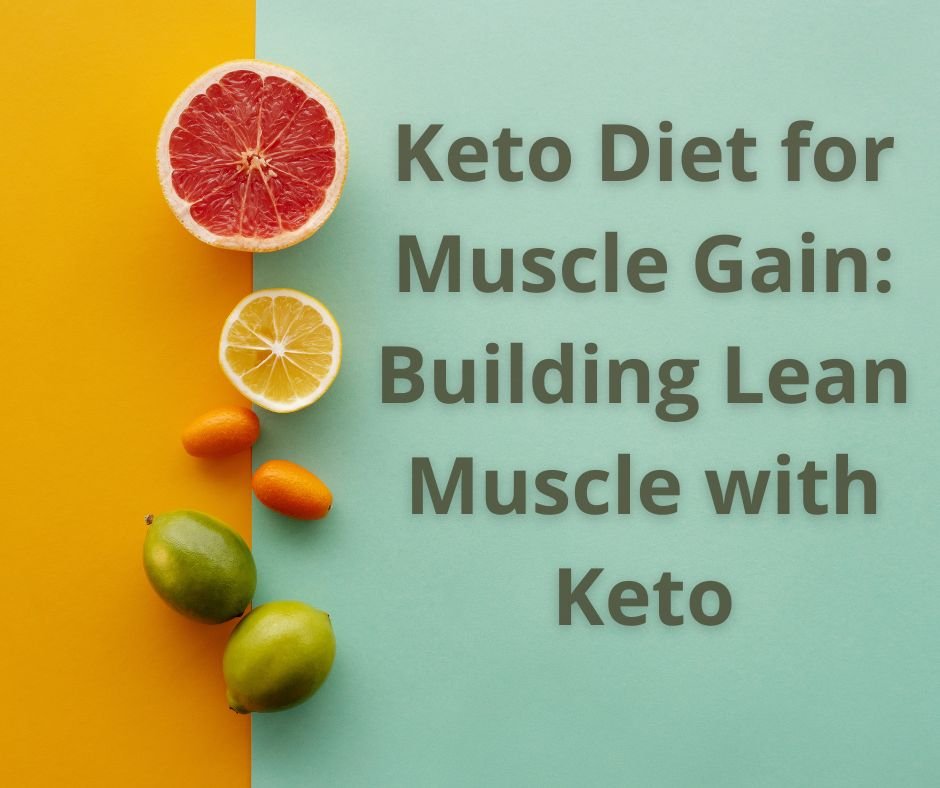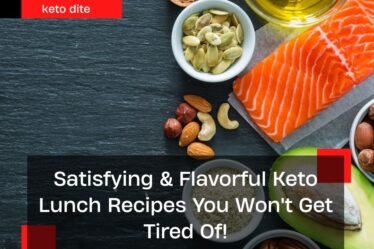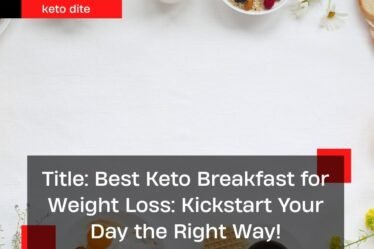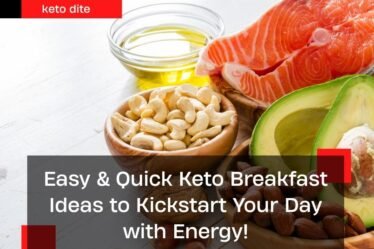
Keto Diet for Muscle Gain: Building Lean Muscle with Keto. Learn how the Keto Diet can help you build lean muscle, burn fat, and improve strength with proper nutrition.
When it comes to building lean muscle, the traditional advice has often been centered around high-carb diets to fuel workouts and promote muscle growth. However, the Keto Diet, a low-carb, high-fat diet, is gaining popularity among fitness enthusiasts for its ability to support muscle gain while also burning fat. While many people associate the Keto Diet with weight loss, it can also be an effective approach for muscle gain, especially if you’re looking to build lean muscle and achieve a toned, defined physique.
In this article, we will explore how the Keto Diet works for muscle gain, the science behind it, and tips on how to maximize your results while following a ketogenic lifestyle.
What is the Keto Diet?
The Keto Diet is a high-fat, moderate-protein, and very low-carbohydrate diet that encourages the body to enter a metabolic state called ketosis. In ketosis, your body shifts from using glucose (from carbohydrates) as its primary energy source to using ketones (from fat). This process is great for burning fat and maintaining energy levels, which is why the Keto Diet is commonly used for weight loss. However, when applied correctly, it can also help build lean muscle, especially when combined with strength training and proper nutrition.
How the Keto Diet Can Help Build Lean Muscle.
While carbohydrates are traditionally seen as a key source of energy for muscle growth and recovery, the Keto Diet can also support muscle gain in several unique ways. Here’s how:
Increased Fat Burning.
One of the main benefits of the Keto Diet is that it shifts the body’s energy source from carbohydrates to fat. When you burn fat for fuel, your body becomes more efficient at burning excess body fat while preserving muscle mass. For those looking to build lean muscle, this is ideal because it allows you to get leaner while still maintaining muscle mass.
Stable Insulin Levels.
Carbohydrates trigger insulin production, which plays a role in muscle growth but can also promote fat storage when consumed in excess. The Keto Diet helps to stabilize insulin levels by reducing carb intake. Stable insulin levels allow your body to use fat for fuel while also creating the optimal environment for muscle repair and growth.
Muscle Preservation.
One of the challenges of losing fat while building muscle is ensuring that muscle mass isn’t lost in the process. The Keto Diet helps to preserve muscle mass because of the high protein and fat intake, which encourages muscle repair and recovery without triggering fat storage. By providing adequate protein, the diet supports the repair and growth of muscle fibers after workouts.
Higher Energy Levels for Workouts.
Contrary to the myth that low-carb diets leave you fatigued, many people experience increased energy levels on the Keto Diet. This is because the body becomes more efficient at burning fat for fuel, which provides a steady and long-lasting source of energy. With more energy during workouts, you can perform better and push yourself harder, which can ultimately lead to more muscle growth.
Reduced Inflammation.
Inflammation is a common issue for athletes and fitness enthusiasts, especially after intense workouts. The Keto Diet has anti-inflammatory effects, which can help reduce muscle soreness and improve recovery times. By decreasing inflammation, you can train more frequently, which leads to more opportunities for muscle growth.
Key Foods for Building Muscle on the Keto Diet
To support muscle gain on the Keto Diet, you need to prioritize nutrient-dense, high-quality foods that provide the necessary building blocks for muscle growth and recovery. Here are the top foods to include in your Keto muscle-building diet:
Healthy Fats
Healthy fats are essential for hormone production, including testosterone and growth hormones, both of which are crucial for muscle growth. Include sources like avocados, olive oil, coconut oil, and fatty fish (like salmon and mackerel) in your meals.
High-Quality Protein
Protein is essential for muscle repair and growth. While the Keto Diet is high in fat, it’s also important to get enough protein to support muscle gain. Focus on grass-fed beef, free-range chicken, eggs, turkey, and wild-caught fish. These protein sources are not only rich in amino acids but also provide essential nutrients that support muscle health.
Leafy Greens and Vegetables
Although the Keto Diet is low in carbs, it’s important to include plenty of low-carb vegetables, especially leafy greens like spinach, kale, and arugula. These vegetables are high in vitamins, minerals, and fiber, all of which support overall health and muscle function. They also help reduce inflammation and support recovery.
Nuts and Seeds
Nuts (like almonds, walnuts, and macadamia nuts) and seeds (like chia seeds and flaxseeds) are excellent sources of protein and healthy fats. They can provide sustained energy and are a great snack for those on the go.
Dairy.
Full-fat cheese, Greek yogurt, and heavy cream are excellent sources of protein and fat. They also contain calcium, which is essential for muscle function and bone health. Just make sure to choose options that are low in carbs and free from added sugars.
How to Maximize Muscle Gain on the Keto Diet
While the Keto Diet can be effective for muscle gain, there are a few strategies you can use to maximize your results:
Focus on Strength Training.
To build lean muscle, strength training is essential. Aim to perform weightlifting exercises 3-4 times per week, focusing on compound movements like squats, deadlifts, bench presses, and rows. These exercises target multiple muscle groups and stimulate muscle growth.
Get Enough Protein.
Protein is the building block of muscle, so make sure you’re getting enough to support muscle repair and growth. A good rule of thumb is to consume 1.2 to 2.0 grams of protein per kilogram of body weight per day. This can be adjusted based on your individual goals and activity level.
Stay in a Slight Caloric Surplus
While the Keto Diet promotes fat burning, building muscle requires a caloric surplus. This doesn’t mean you need to eat excessive amounts of food, but you should consume enough calories to support muscle repair and growth. Aim for a slight surplus, typically 10-15% more than your maintenance level.
Post-Workout Nutrition
After a workout, your body needs nutrients to repair muscle fibers. On the Keto Diet, focus on consuming a post-workout meal with a balance of protein and healthy fats. For example, a grilled chicken breast with avocado or an omelet with spinach and cheese.
Hydrate and Supplement with Electrolytes
Staying hydrated is important for muscle function, especially on the Keto Diet. When you first start the diet, you may experience an electrolyte imbalance due to the reduction in carbs. Supplementing with magnesium, potassium, and sodium can help maintain optimal hydration levels and prevent cramping during workouts.
Potential Risks of the Keto Diet for Muscle Gain.
While the Keto Diet has numerous benefits, it’s important to be aware of potential risks:
Loss of Lean Muscle Mass in the Initial Phase
Some people experience a slight reduction in muscle mass during the first few weeks of the Keto Diet as the body adapts to burning fat for fuel. However, this is usually temporary, and as your body becomes accustomed to ketosis, you’ll be able to retain and build muscle.
Nutrient Deficiencies.
The Keto Diet is restrictive, and if not properly planned, it can lead to nutrient deficiencies. Make sure to include a variety of nutrient-dense foods to support muscle health and overall well-being.
Difficulty Maintaining the Diet Long-Term
The strict nature of the Keto Diet can make it challenging for some people to stick with it in the long term. It’s important to assess whether this diet is sustainable for you in the long run before fully committing to it.
Conclusion.
The Keto Diet offers a unique approach to building lean muscle while simultaneously burning fat. By focusing on high-quality fats and proteins, stabilizing insulin levels, and following a proper strength training program, you can build muscle effectively on the Keto Diet. However, as with any diet, it’s important to ensure you’re getting the right nutrients and staying on track with your goals. If done correctly, the Keto Diet can be an excellent tool to help you achieve a leaner, more muscular physique.


